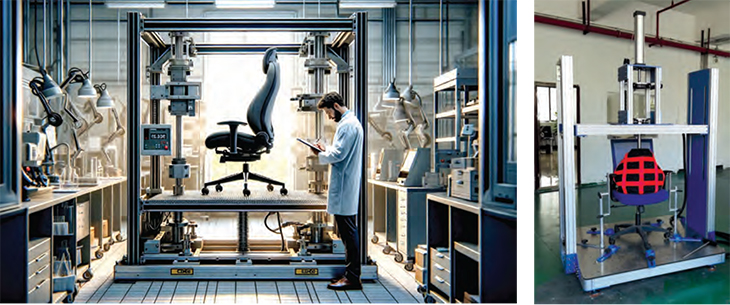BIFMA: steps to attain global industry standards

Godrej Interio, Steelcase India, Herman Miller India, KI India, JSI India and IKEA India have integrated BIFMA-compliant products into their offerings.
The Business and Institutional Furniture Manufacturers’ Association (BIFMA) is a non-profit, mission-driven organization that has been a leading voice in the commercial furniture industry since 1973. Headquartered in the United States, BIFMA (https://www.bifma.org/) represents the shared interests of commercial furniture manufacturers and their suppliers globally.
The organisation is committed to developing safety, durability and sustainability standards for the industry. The standards developed are accredited by the American National Standards Institute (ANSI) and serve as benchmarks for quality and performance in the furniture industry.
These standards help manufacturers ensure their products meet or exceed rigorous safety and performance criteria, fostering trust between producers and consumers alike.
BIFMA’s membership consists of a diverse group of manufacturers and suppliers that play a pivotal role in shaping the industry. By fostering collaboration and knowledge-sharing, BIFMA aims to advance innovation and promote the growth of its members. This includes providing resources, research and advocacy that amplify members’ impact on the industry.
One of its key contributions is its certification programmes, which are widely recognized marks of excellence. These certifications address various aspects, including material health, energy efficiency and social responsibility, from a comprehensive life cycle perspective. Through these programmes, BIFMA emphasizes the importance of both product integrity and environmental sustainability.
Performance, reliability
Established to provide manufacturers with consistent guidelines, the standards ensures that office furniture products meet high levels of performance and reliability. Adherence to the standards is a testament to a piece of furniture’s ability to withstand the rigors of daily use while maintaining its functionality and aesthetics.
These standards cover a wide range of criteria, including structural integrity, material quality, ergonomic design, and environmental impact. By setting these comprehensive requirements, it helps protect the health and safety of users, promoting ergonomic benefits, and enhancing overall user comfort.
In addition to fostering product quality and safety, the organisation places significant emphasis on environmental stewardship. The standard not only ensures that furniture meets rigorous safety and performance criteria but also encourages manufacturers to adopt sustainable practices.
By reducing waste during manufacturing and minimizing the use of harmful materials, these certified products contribute to a healthier planet. This commitment to sustainability aligns with the industry’s growing focus on greener, more eco-friendly practices.
Businesses and consumers alike benefit from choosing BIFMA-compliant furniture, as it signifies a dedication to durability, safety, and environmental responsibility.
Investing in BIFMA-certified products not only ensures longevity and user satisfaction but also demonstrates a commitment to reducing the environmental footprint of office environments. It’s a choice that yields both immediate and long-term benefits, promoting a healthier workspace while contributing to a more sustainable future.
Testing process
Testing must be conducted by a highly specialized and accredited entity. Only an ISO 17025 accredited testing laboratory, recognized through the International Laboratory Accreditation Cooperation (ILAC) accreditation channel, is authorized to perform this testing.
This accreditation assures that the laboratory operates with the highest standards of technical competence and quality management. The testing process follows a systematic approach to ensure office furniture meets the stringent standards set for safety, durability, and sustainability:
• The process begins when you send a sample of your furniture product to an accredited laboratory. It is important that the sample is representative of your product line and meets the criteria for testing under BIFMA standards.
• Upon receiving your product sample, the team of experts will conduct a series of tests based on the relevant BIFMA standard applicable to your product. BIFMA has established various standards that cover different aspects of office furniture, including structural integrity, safety, ergonomics, and environmental impact. The laboratory uses state-of-the-art equipment and methodologies to ensure a comprehensive evaluation.
• After completing the tests, a detailed report is compiled, outlining the procedures performed, results obtained, and how they compare to BIFMA standards. If your product meets or exceeds these standards, a certificate is issued. This certificate serves as proof of compliance and can be an asset in marketing your product and building customer trust.

Testing and certification (L) demonstrates compliance with international safety and performance criteria. A seat impact testing machine (R).
Testing in India
CDG Inspection Ltd., based in Manesar, Haryana, is one such BIFMA certifying agency in India (info@cdginspection.com). As an ISO 17025 accredited laboratory, CDG guarantees reliability, comprehensive coverage, and quality assurance throughout the testing process. Why choose CDG for BIFMA testing?
• CDG ensures testing processes meet the highest standards of reliability and accuracy.
• CDG’S testing services cover the full range of BIFMA standards, providing a one-stop solution.
• CDG is listed in BIFMA’s directory of approved laboratories, underscoring its esteemed position in the industry.
• Choosing CDG ensures your furniture products are safe, durable, and environmentally sustainable.
• Furniture tested at CDG can be included in the BIFMA Compliant Registry.
• By selecting a laboratory like CDG, manufacturers gain the assurance needed to stand out in the competitive furniture market.
Activities in India
Several cities across India, including Mumbai, Delhi, Bengaluru, Chennai, Pune, Hyderabad, and Ahmedabad, have witnessed an increasing number of companies obtaining BIFMA certification to demonstrate compliance with international safety and performance criteria.
BIFMA’s sustainability initiatives, such as the Level Sustainability Certification, have a strong presence in India. Indian companies are adopting Level to evaluate and communicate the environmental and social impacts of their products, ensuring that their furniture offerings are sustainable throughout their life cycle.
Indian furniture manufacturers – such as Godrej Interio, Steelcase India, Herman Miller India, KI India, JSI India, and Bengaluru-based IKEA – are setting the pace for others by integrating BIFMA-compliant products into their offerings.
Additionally, BIFMA’s educational resources, including workshops, seminars, and conferences, are regularly held in India to keep manufacturers and industry professionals informed about the latest developments in furniture standards, regulations, and market trends.
Its works closely with regulatory bodies in India to influence furniture regulations, ensuring that Indian industry standards align with global benchmarks. This collaboration has led to the development of industry-specific safety guidelines for different segments of furniture, including office seating, storage systems, and healthcare furniture.
It has also played a significant role in engaging with customer groups like the Indian Institute of Interior Designers (IIID) and the Indian Furniture Products Association (IFPA), educating them about the value of BIFMA-compliant products.
The association’s activities in India reflect the country’s growing recognition of the need for high-quality, sustainable, and ergonomic office furniture. As more Indian manufacturers adopt its standards and certifications, the Indian furniture industry is aligning itself with global expectations in terms of safety, performance, and environmental impact.
Comments

- Digital lacquer embossing for flooring from Hymmen
- Weber sanders help achieve luxury surfaces
- UF resin: blessing in disguise
- Cost savings for new factory investments
- Forest management for sustainable supply from B.C. Canada
- Egger’s ‘Capsule Concept’ creates harmonious décor
- Grass releases RAT system for cabinetry
- State-of-the-art edge bander from Jai
- SCM’s Balestrini centres for solid wood
- Sugatsune introduces new concealed hinge for doors
- Aryamman brings home Konrad Hornschuch products
- Automatic beam saw with twin pusher from Woodtech
- Seamless functional doors from Fiamarc
- Felder offers range of wide belt sanders
- OptiSaw 3.2 Panel Saw
- New guidelines to curb ‘green-washing’
- Ozone opens Experience Centre in Bengaluru
- Dieffenbacher takes over Schmidt & Heinzmann
- Egger invests in sustainability and automation
- Demand for American Oak soars in India
- Nitori to open first store in India
- Bureau Veritas acquires AI company
- Siempelkamp secures syndicated loan
- Merino to reduce carbon footprint
- Ebco’s new campaign features ‘Boom-Boom’ Bumrah
- SCM wins SMAU innovation award
- Unilin wins patent for flooring
- WhatsApp kicks off training for businesses
- SCM takes over Mecal Machinery
- Rajesh Mittal to head FIPPI
- Birla Opus opens fourth paints factory
- Greenply roots for ‘Pushpa 2’
- Wooden Street raises ₹354 cr. in funding
- Ashima Kaul recognized as top HR Leader
- Dieffenbacher’s ‘Osiris’ set to revolutionise fibreboard recycling
- BIFMA: steps to attain global industry standards
- In Silver Jubilee year, propelling growth remains the ‘mantra’
- PHANTOM HANDS
- ‘Fevicol Pro series is disruptive innovation’
- Furtech Show 2025 returns to Dubai in September
- Vert: the red-oak route to a cool-cool city
- Moisture? Measure twice, cut once!
- ‘Mirka has solutions for today, tomorrow, thereafter’
- On 50th anniversary, Ligna has more on offer
- Ukrainian designer redefines function through form












































